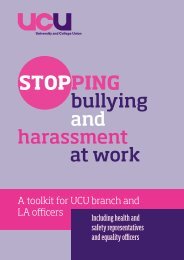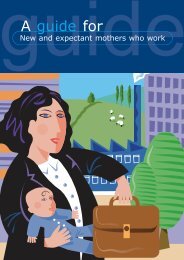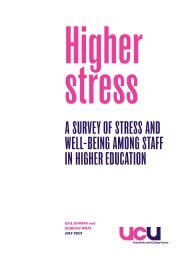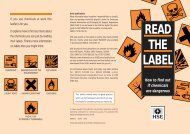UCU Life Changers Text
UCU Life Changers Text
UCU Life Changers Text
Create successful ePaper yourself
Turn your PDF publications into a flip-book with our unique Google optimized e-Paper software.
InOiring<br />
Rudents<br />
Jane Challenger<br />
Gillitt<br />
Professor<br />
William Beinart<br />
Jim Bradley<br />
Dr Hazel Cox<br />
Jane Hadcock and<br />
Katherine Chisnell<br />
Dr Rehan ul-Haq<br />
Tessa Hall<br />
Carolyn Harries<br />
Arthur Keefe<br />
Dr Kevin McCarron<br />
Dr David Middleton<br />
Leo Murphy<br />
Paul Sander<br />
Dr Tony Stead<br />
Chris Beaumont<br />
Jane Challenger Gillitt<br />
University of Brighton<br />
When Jane Challenger Gillitt studied at university,<br />
giving students practical support was not always top of<br />
the academic agenda.<br />
‘In the past, when I first went to university, there was<br />
a much more traditional kind of approach from<br />
academics: “You get off and do it yourself, and we will<br />
occasionally allow you a few minutes of our time, you<br />
undergraduates!”<br />
But it is Jane and others like her<br />
who have filled the shoes of the<br />
grand professors of old, and she has<br />
a very different attitude to<br />
supporting students. ‘I think there<br />
has been more of a realisation that<br />
one of our purposes is to teach, and in order to do a<br />
good job of that, you have to be available to help<br />
students.’<br />
Jane is now a senior lecturer in the School of<br />
Computing, Mathematical and Information Sciences at<br />
the University of Brighton. A post-92 university, she<br />
points to its strong widening participation agenda and<br />
high enrolment from the local area contributing to an<br />
‘egalitarian’ admissions strategy. But this needs an<br />
open-door policy towards students in order to give<br />
them the necessary support.<br />
‘We are very student-centred,’ says Jane. ‘We are<br />
approachable from the very beginning, so that if they<br />
feel stressed or in need of help, they know they can get<br />
help from us. The help and guidance we give them at<br />
the beginning, where they<br />
see their personal tutor<br />
every week, helps to<br />
support students who may<br />
not be from families with a<br />
tradition of going into<br />
higher education.’<br />
Jane is responsible for<br />
implementing this<br />
approach, working with the<br />
School’s student support<br />
and welfare tutor, who acts<br />
as a referral service for<br />
students. Strong retention<br />
figures in a difficult subject<br />
area suggest the strategy is<br />
working.<br />
Her enthusiasm for the<br />
role is clear. ‘It’s a<br />
responsibility that I’m really<br />
happy to have,’ she says. ‘I like the students at the<br />
beginning and I like them at the end. They’re very fresh<br />
and enthusiastic, and as long as we can foster that<br />
enthusiasm and channel it, and not allow it to wither by<br />
indifference, then hopefully we can give them a really<br />
good start and they can take off on their own from<br />
there.<br />
‘I’m sure many staff don’t actually remember when<br />
they first went away from home and how it felt,<br />
because it’s not all a great adventure. Sometimes it’s<br />
absolutely terrifying. There are so many challenges. It’s<br />
not just the academic side, it’s the social side, and the<br />
practical side. And it can be really daunting for them.<br />
You need to realise they are vulnerable and in need of<br />
support.’<br />
Gary McQuade was one student who benefited from<br />
Jane’s<br />
’She saw something that I<br />
didn’t, something that I had to<br />
offer, and she nurtured it.’<br />
willingness to<br />
help. He started<br />
a course in<br />
Computing and<br />
Information<br />
Systems in 2000<br />
as a mature student. ‘I went into a class of younger<br />
people who were fresh out of A-Levels and had a better<br />
grasp of some of the subject matter. I found it rather<br />
intimidating, just trying to stay afloat, and Jane was a<br />
good source of support.<br />
‘No matter what the subject was, even if it was<br />
something she wasn’t an expert in, she would always<br />
take the time to find the information and then come<br />
back to you. She would never give you the answer. She<br />
would try and empower you to do it yourself, purely by<br />
allowing you to look at it from different angles and<br />
perspectives, or by taking a step back.’<br />
Jane explains her approach. ‘The problems really boil<br />
down to straightforward things like time management,<br />
and also getting down to doing it. I think a lot of<br />
students find it difficult to get<br />
started. Once they have<br />
started, then other things will<br />
flow.’<br />
A former Samaritan, she<br />
takes minor concerns from<br />
students in her stride. ‘Well,<br />
the more minor the better<br />
really, because then you can<br />
deal with it easily, can’t you?<br />
We are not counsellors, but we<br />
are here to help them find out<br />
how they can help themselves.’<br />
The time and effort Jane<br />
invested in Gary paid off. He<br />
graduated in 2004, and is now<br />
working for an oil company in<br />
Aberdeen. ‘Jane gave me the<br />
confidence to do a lot of<br />
different things. She made me<br />
realise the value of what I had to offer and the way that<br />
I expressed myself. She saw something that I didn’t,<br />
something that I had to offer, and she nurtured it and<br />
helped me to refine it.’<br />
‘Well, that’s what we’re here for,’ says Jane.<br />
Page 6<br />
www.ucu.org.uk/lifechangers


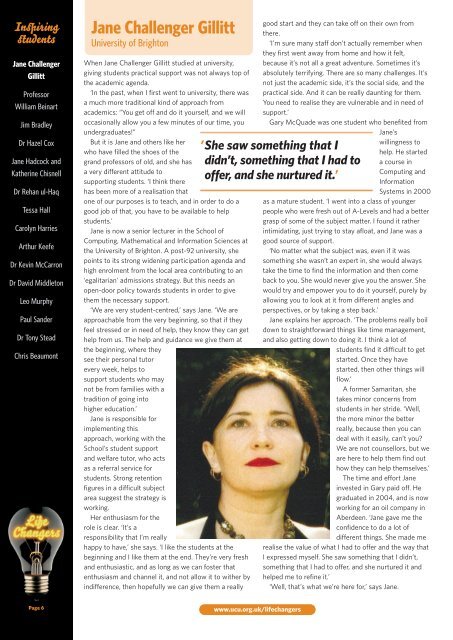

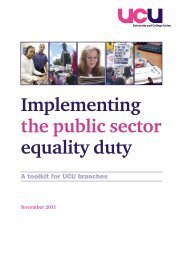
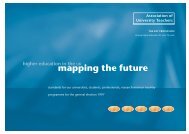
![(.pdf) [29kb] - UCU](https://img.yumpu.com/50914942/1/184x260/pdf-29kb-ucu.jpg?quality=85)
